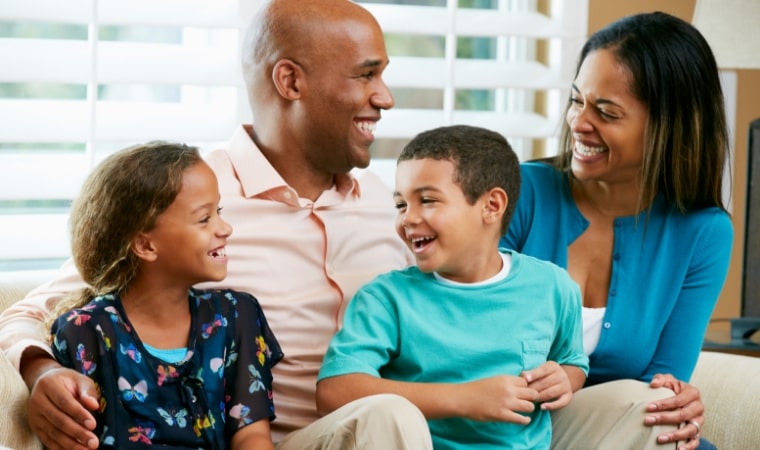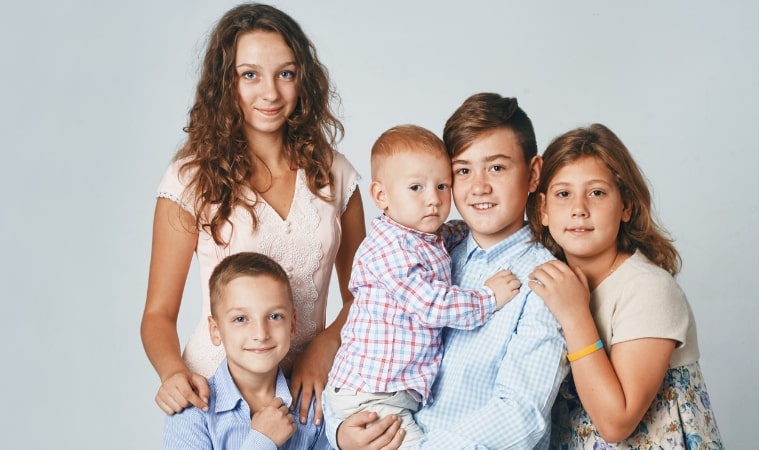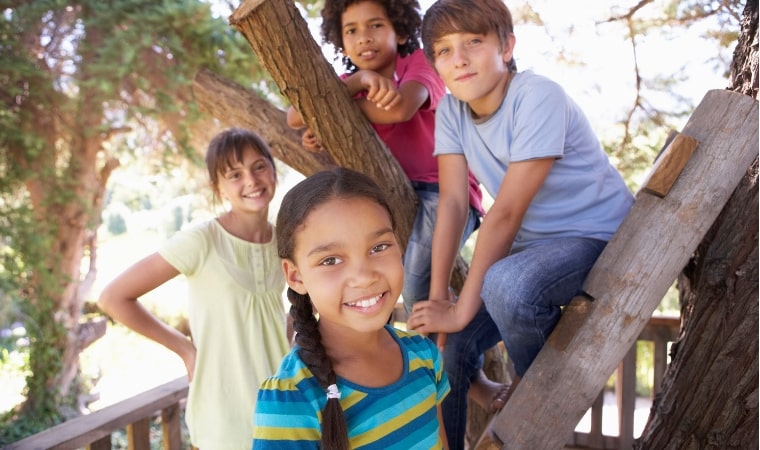Inside: There are many advantages of sex education. From keeping your kids safe from sexual abuse to teenagers delaying sexual intercourse.
Most parents, know that eventually, they will need to talk with their kids about sex… one day.
Well, just in case you were still in denial or hoping to get out of it, I’m going to give you 13 good reasons as to why you need to have these important conversations with your kids.
And yes, there are at least 13 advantages of sex education, if not more!
You’ll find more information about sex education in my Sex Education 101 page.
Advantages in the early years
This is what the research tells us about the advantages of sex education in the early years. You’ll find the references at the bottom of this article.
1. Body positive
Your child is more likely to feel positive about their body.
By talking to our kids about their bodies in an open and honest way, we are giving them the message that there is nothing to be ashamed of. Especially when we include their genitals or private body parts into the conversation. If you’re unsure about how to talk to your child about their body, then my parent guide, Let’s Talk About Bodies, can help you to get started.
So what does that mean to me as a parent?
My kids are more likely to be happier with the body that have instead of wanting what they haven’t got! There is a lot of pressure today to have the perfect body and to look a certain way!
2. Healthy gender identity
Your child will feel good about being a boy or a girl.
An important part of child sexual development is to understand what your gender is.
Gender is very different from sex. Sex is something that is assigned at birth ie male, female or intersex and is pretty much based on what your genitals look like at birth. Whereas gender is something that we work out for ourselves and is pretty much based on how we feel ie do you feel like a boy, or a girl, or both or maybe neither. You can read more in this blog post, about the difference between gender and sex.
So an important part of growing up for kids is to develop and express their gender identity. This can be especially challenging when their gender doesn’t match their genitals eg a child may have a penis but may identify as being a girl (instead of a boy).
Sex education includes many conversations about gender so that kids can grow up feeling okay about who they are.
So what does that mean to me as a parent?
My kids will grow up with a healthy sense of what it is to be male and female. So they will play with toys that are gender-neutral as well as with toys that target the same or opposite gender. Plus we will read books that show people in non-stereotypical roles. This is even more important if my child has genitals that look different (intersex) or if they identify as being a different gender as they grow up (transgender). Some stuff you can’t control, so it is important to keep an open mind, just in case your child is different!
3. Diversity friendly
Your child will appreciate and accept individual differences.
Diversity is all about differences. So in sex education, we talk about the fact that everyone is different and that’s okay. Which means that our kids grow up accepting of the differences in others as well as in themselves. When kids grow up understanding that ‘everyone is different and that’s okay’, they grow up being tolerant and accepting of same-sex relationships, transgenderism, different skin colour, disabilities and more.
So what does that mean to me as a parent?
My kids will grow up accepting that we are all different and unique (themselves included)! This comes in very handy when they start to notice the diversity around them in family, friends and the world around them. Plus they won’t be discriminating against people because of their differences.
4. Better parent/child communication
Your child is more likely to talk to you about things.
One of the biggest benefits of sex education is that it makes you an askable parent. Kids know that are open to their questions because you are already talking to them about love, sex, relationships and growing up. Which means that instead of turning to their friends or the internet, they are more likely to turn to you first.
And as they get older, and receive a lot of misinformation and mixed messages about sexuality, they’ll know that they can turn to you for help them in working out fact from fiction.
So what does that mean to me as a parent?
If my kids can talk to me about sex, it means that they know they can talk to me about anything! From bullying to parties to having sex. No topic should be too shameful. (And as my kids grow older, I see this happening more and more each day!)
5. Recognise boundaries
Your child is more likely to understand appropriate and inappropriate behaviour.
Keeping our bodies safe is an important part of sex education. By teaching body safety to our kids, we are increasing the chances of them being able to recognise appropriate and inappropriate behaviour. Which means that they will know if someone touches them inappropriately, they will recognise this and hopefully tell a trusted adult. Which means that it will stop.
So what does that mean to me as a parent?
My kids know what behaviour is appropriate and what is not appropriate eg. it is okay for our family doctor to look at your penis (as long as mum or dad is there) but it isn’t okay for the babysitter to look at your penis.

6. Accepting of change
Your child is more likely to understand and accept physical and emotional changes.
This might seem like a strange one to include, but it is really important. Many kids approach puberty and are scared by the changes that are happening to them.
If kids know that puberty will happen to them and that their feelings and body will change, then they are much more accepting of these changes. They just accept it as a fact of life and aren’t as scared or resistant to the change. A great book for starting these early conversations is Hair in Funny Places by Babette Cole. This book will make your kids start wishing puberty would happen sooner rather than later!
So what does that mean to me as a parent?
My kids are okay about the fact that their bodies are changing. They know that puberty is going to happen one day and that their body will change and that they will start to feel differently. Being prepared makes it a lot less scary!
7. Disclose sexual abuse
Your child is more likely to report inappropriate sexual touch.
Teaching children protective skills is an important part of sex education in the early years. This includes teaching children about secrets, body safety, feelings, early warning signs, persistence, public and private, personal space, having a safety team and more.
If kids have these protective skills, they are better able to recognise sexual abuse and to tell someone about it.
So what does that mean to me as a parent?
If my child is being groomed or is sexually abused, I want to know about it. Being approachable means that my kids know that they can tell me anything. And that includes sexual abuse. Plus they have the protective skills to recognise it and to try and stop it.
8. Safer from sexual abuse
Your child is more likely to be less vulnerable to exploitation and sexual abuse.
Sex education will also keep your child safer from sexual abuse. The best target for a paedophile is a child who doesn’t know how to keep themselves safe. Which means that if your child has some protective skills, perpetrators will hopefully move onto someone else. Which keeps your child safe!
So what does that mean to me as a parent?
That perpetrators are more likely to leave my child alone as they won’t be an easy target. Which means that they are much safer from sexual abuse, whether it comes from a complete stranger, a family friend or family member.
The teenage years
You start to see some really good advantages of sex education when your kids become teenagers. The teens years are where the hormones really start to kick in and sexuality begins to take on a sexual nature!
We know that good sex and relationship education has the following outcomes on teenagers.
9. Make smart sexual decisions
Your teen is more likely to make informed and responsible sexual decisions in later life.
Information about sex isn’t permission to be sexual. It simply empowers teens to make smarter decisions about sex. And there is plenty of research to back up the fact that kids who miss out on sex education are the ones that end up making bad choices because of ignorance or misinformation.
Plus when we talk to our kids about sexual values, we are providing them with a framework to make good decisions. Instead of letting them be guided by their peers and what they see in the media (tv, movies, internet, magazines, etc).
So what does that mean to me as a parent?
That my teen will have the information to make smart sexual decisions. They won’t make the same mistakes that I made because of ignorance. Plus they are more likely to have values and beliefs that are similar to mine.
10. Delay sexual activity
Your teen is more likely to be older (than average) when they first try a sexual activity.
Kids who have had open and honest conversations with their parents about love, sex and relationships, are less likely to rush into sexual relationships. They have grown up knowing what sex is all about, and don’t see it as a way to make themselves feel more grown-up. Which means that they will start to become sexual with a partner when they are ready to. Not when their friends, partner or peers tell them to. Which means that they are usually much older (and wiser) than their friends when they do get around to it.
So what does that mean to me as a parent?
That my teen will only be sexual with a partner when they’re ready and not just because their friends are!

11. Sex will be safer and consensual
A teenager’s first experience of sex is more likely to be wanted, protected and competent.
Consent is an important part of sex education. Teens with a good understanding of consent are better able to make smarter sexual decisions. Plus when they are sexual with a partner, they are more likely to enjoy what they are doing and to be doing it safely.
You can read this article for some ideas about how to start talking to your child about consent.
So what does that mean to me as a parent?
I don’t know what your first sexual experience was like, but I would like to think that my teen will only be ‘doing it’ because they want to and not because they were forced or pushed into it. I also want them to enjoy sex with someone they care about, and for there to be no unforeseen circumstances, like an unplanned pregnancy or an STI.
12. No unwanted pregnancy
Teenagers are more likely to be aware of how to avoid unwanted pregnancy and abortion.
Most unplanned pregnancies in teens happen because of ignorance ie they didn’t know how to prevent pregnancy. Or they had the wrong information or didn’t fully understand what they were told.
So information about contraception will empower your child to make smart sexual decisions.
So what does that mean to me as a parent?
I want my teen to only become a parent when they are ready to and not by mistake!
13. No STIs
Teenagers are more likely to avoid sexually transmitted infections (STIs).
Safe sex can only happen if teens know how to prevent the spread of infection. Which means they need to have access to information about how to keep themselves safe. Not all STIs are treatable, which can mean lifelong implications for your teen.
So what does that mean to me as a parent?
Some STIs are treatable and some aren’t – but they all cause a great deal of stress for all involved! If my teen can avoid them, that is good news!
Summary
So, what do you think? Are there any benefits that seem really attractive to you? Do you see any advantages of sex education, that you really like the sound of?
Let me know below, in the comments!
For me personally, I think the long term benefits are the ones that are really worth waiting for ie the ones for the teenage years!
References
- Goldman, R. and Goldman, J. 1982. Children’s sexual thinking: A comparative study of children aged 5 to 15 years in Australia, North America, Britain, and Sweden.
- Goldman, R. and Goldman, J. 1982. Children’s sexual thinking: A comparative study of children aged 5 to 15 years in Australia, North America, Britain, and Sweden.
- Goldman, R. and Goldman, J. 1982. Children’s sexual thinking: A comparative study of children aged 5 to 15 years in Australia, North America, Britain, and Sweden.
- Finkelhor, D. 2007. Prevention of Sexual Abuse Through Educational Programs Directed Toward Children.
- Goldman, R. and Goldman, J. 1982. Children’s sexual thinking: A comparative study of children aged 5 to 15 years in Australia, North America, Britain, and Sweden.
- SIECUS. 1998. Right from the Start: Guidelines for Sexuality Issues
- Sanderson, J. 2004. Child-Focused Sexual Abuse Prevention Programs: How Effective are They in Preventing Child Abuse?
- Finkelhor, Asdigian & Dziuba-Leatherman. 1995. The effectiveness of victimization prevention instruction: An evaluation of children’s responses to actual threats and assaults, Briggs. 1991. Child protection programs: Can they protect young children?, Finkelhor, D. 2007. Prevention of Sexual Abuse Through Educational Programs Directed Toward Children, and QLD Crime Commission & QLD Police Service. 2000. Project AXIS: Child Sexual Abuse in Queensland: The Nature and Extent.
- Kirby, Douglas. 2001. Emerging Answers: Research Findings on Programs to Reduce Teen Pregnancy.
- With One Voice: America’s Adults and Teens Sound Off About Teen Pregnancy. 2012.
- With One Voice: America’s Adults and Teens Sound Off About Teen Pregnancy. 2012.
- With One Voice: America’s Adults and Teens Sound Off About Teen Pregnancy. 2012.
- With One Voice: America’s Adults and Teens Sound Off About Teen Pregnancy. 2012.
Resources to help with talking about puberty
My mission is to create resources that will help you to naturally talk to your kids about sex, all while respecting your personal values.
Which means that inside this website, you’ll find lots of resources to help you with talking to your child about puberty.
My Sex Ed 101 page includes all of the information on sex education. You’ll find lots of different blog posts to help you gain a better understandign of what sex education is all about.
You’ll find videos about sex education in my Sex Education Videos resource page that you can watch with your child or to learn more about sex education yourself.
You’ll also find an extensive range of children’s sex education books, for kids of all ages.
If you’re unsure about how to answer your child’s questions about sex, then I have the perfect book for you! The Sex Education Answer Book will give you age-specific answers to the most common questions kid’s ask parents about sex. Which means you don’t need to worry about finding a child-friendly explanation that your child understands.
If you need some help with explaining sexual intercourse to your child, then you may like my Masterclass on explaining sex for the very first time or my parent guide will also help you explain sex to your child in a way they will understand. It breaks sex down into simple steps that take the stress out of explaining!
Plus you will find plenty more sex education resources at the Sex Ed Shop.
And if you get stuck, feel free to get in touch! You can contact me here.




